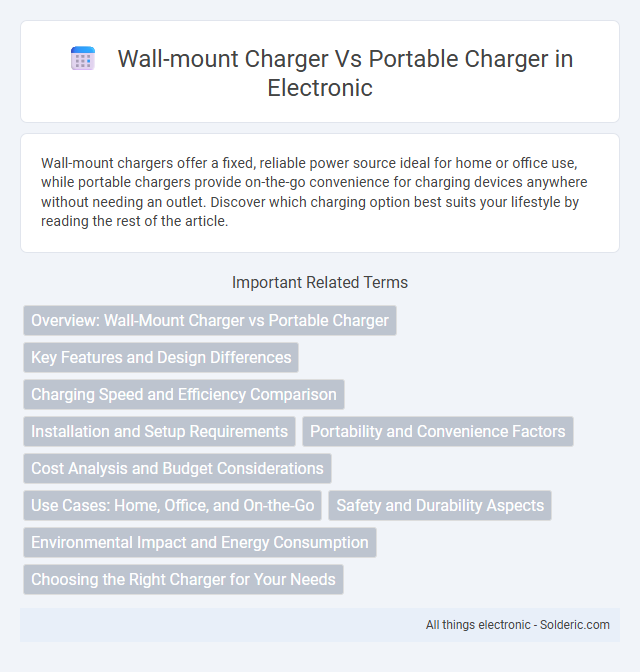Wall-mount chargers offer a fixed, reliable power source ideal for home or office use, while portable chargers provide on-the-go convenience for charging devices anywhere without needing an outlet. Discover which charging option best suits your lifestyle by reading the rest of the article.
Comparison Table
| Feature | Wall-mount Charger | Portable Charger |
|---|---|---|
| Power Source | Fixed wall outlet | Rechargeable internal battery |
| Portability | Stationary, not portable | Compact, easy to carry |
| Charging Speed | Typically faster, consistent power | Varies, slower than wall charger |
| Usage | Home, office, stationary use | Travel, outdoor, on-the-go |
| Power Capacity | Unlimited while plugged in | Limited by battery size |
| Cost | Generally lower | Usually higher due to battery |
| Convenience | Requires fixed location | Allows charging anywhere |
Overview: Wall-Mount Charger vs Portable Charger
Wall-mount chargers provide a fixed power source with consistent charging speeds ideal for stationary use at home or office, featuring stable electrical output and space-saving design. Portable chargers, also known as power banks, offer mobility and on-the-go charging capabilities with variable capacity measured in mAh, supporting multiple device recharges without the need for an outlet. Choosing between them depends on user lifestyle, with wall-mount chargers suited for everyday stationary use and portable chargers optimized for travel and emergency power backup.
Key Features and Design Differences
Wall-mount chargers are typically fixed units designed for stationary use with higher power output and integrated cable management, providing a tidy and reliable charging solution for home or office environments. Portable chargers emphasize compactness, lightweight design, and battery capacity, allowing You to charge devices on the go without requiring a power outlet. Key differences include wall chargers' permanent installation and continuous power supply versus portable chargers' mobility and finite stored energy.
Charging Speed and Efficiency Comparison
Wall-mount chargers typically offer faster charging speeds and higher power output, often supporting up to 65W or more, enabling quicker device replenishment and improved energy efficiency. Portable chargers generally provide lower power capacity, ranging from 18W to 45W, which can result in slower charging times but greater convenience and mobility. Efficient power delivery technology such as GaN in wall-mount chargers significantly enhances charging speed compared to the standard lithium-ion battery capacity constraints found in portable chargers.
Installation and Setup Requirements
Wall-mount chargers require professional installation, as they must be securely attached to a wall and connected to an electrical circuit, often involving hardwiring and compliance with local electrical codes. Portable chargers offer plug-and-play convenience, needing only an accessible power outlet without permanent installation or specialized tools. The installation complexity and setup time for wall-mount chargers are significantly higher compared to the immediate deployability of portable chargers.
Portability and Convenience Factors
Wall-mount chargers offer consistent power supply without the need to carry additional devices, ideal for stationary use, while portable chargers provide high mobility and convenience for charging on-the-go. Portable chargers vary in capacity and size, allowing users to select models that balance power output with lightweight design for travel and outdoor activities. The choice hinges on the user's lifestyle, with wall-mount chargers suiting fixed locations like homes or offices, and portable chargers catering to dynamic environments and emergency power needs.
Cost Analysis and Budget Considerations
Wall-mount chargers typically require a higher initial investment due to installation fees and fixed infrastructure, making them a cost-efficient choice for long-term use in a single location. Portable chargers offer flexibility and lower upfront costs but often involve ongoing expenses such as replacement batteries and less efficient charging rates. Understanding your charging habits and budget constraints helps determine which option provides the best value for your specific needs.
Use Cases: Home, Office, and On-the-Go
Wall-mount chargers are ideal for home and office settings where a fixed, reliable power source is needed for consistent device charging. Portable chargers excel for on-the-go use, providing flexible, battery-powered charging for travel, outdoor activities, or emergency situations without access to outlets. Your choice depends on whether you prioritize stationary convenience or mobile power availability.
Safety and Durability Aspects
Wall-mount chargers offer enhanced safety features such as built-in surge protection and stable mounting that reduces the risk of cable damage, while portable chargers prioritize durability with rugged, shock-resistant designs for on-the-go use. Your choice should consider that wall-mount chargers typically have better heat dissipation due to fixed installation, reducing overheating risks. Portable chargers often include reinforced casing and waterproofing to withstand drops and environmental exposure, ensuring reliable performance outside home settings.
Environmental Impact and Energy Consumption
Wall-mount chargers typically have a lower environmental impact due to efficient energy use and reduced production materials compared to portable chargers, which require batteries that can pose disposal challenges. Energy consumption from wall-mount chargers is often more stable and efficient, as they draw power directly from an electrical outlet without the energy losses associated with charging and discharging batteries in portable chargers. Choosing your charging method with sustainability in mind helps minimize waste and optimize energy use over time.
Choosing the Right Charger for Your Needs
Wall-mount chargers offer a fixed, space-saving solution ideal for consistent charging in one location, providing reliable power and reducing clutter. Portable chargers deliver the convenience of on-the-go power, perfect for travel and situations where access to a power outlet is limited. Your choice depends on whether you prioritize stationary efficiency or mobility and flexibility in charging your devices.
Wall-mount charger vs Portable charger Infographic

 solderic.com
solderic.com